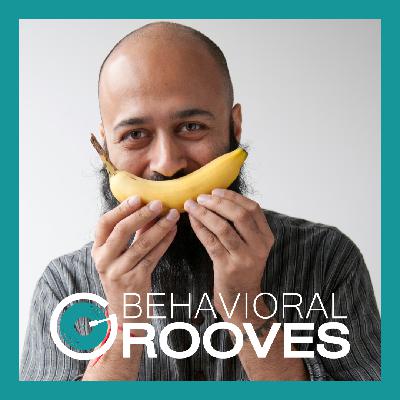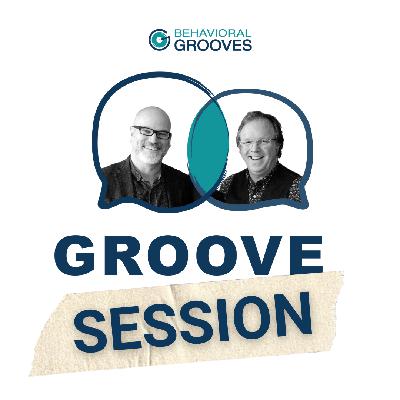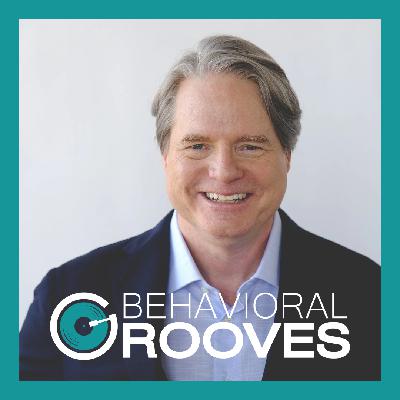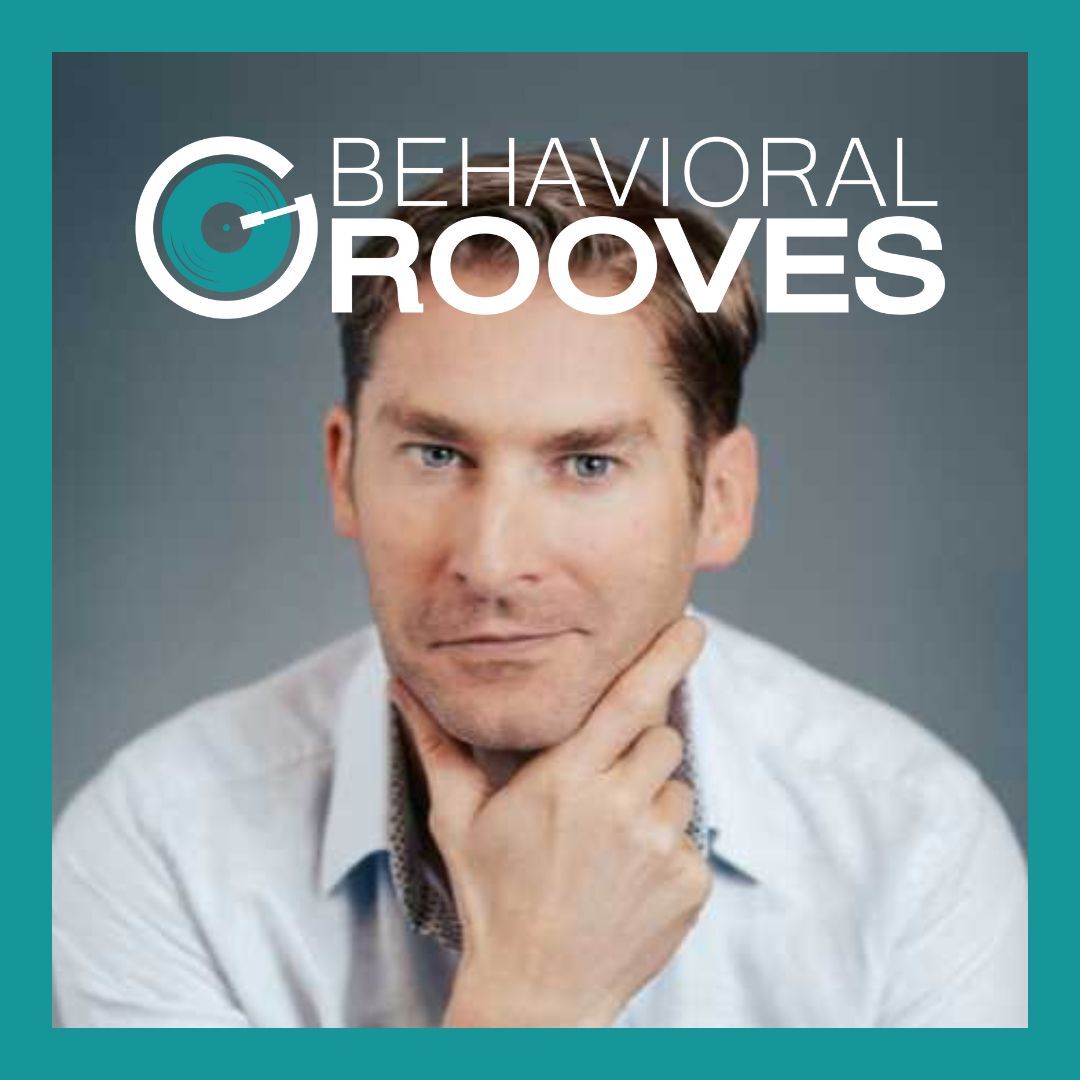Discover Behavioral Grooves Podcast
Behavioral Grooves Podcast

Behavioral Grooves Podcast
Author: Kurt Nelson, PhD and Tim Houlihan
Subscribed: 387Played: 17,461Subscribe
Share
© Copyright 2024 Behavioral Grooves . All rights reserved.
Description
Stories, science and secrets from the world’s brightest thought-leaders. Behavioral Grooves is the podcast that satisfies your curiosity of why we do what we do. Explanations of human behavior that will improve your relationships, your wellbeing, and your organization by helping you find your groove.
493 Episodes
Reverse
Cognitive scientist Steve Sloman joins us to discuss The Cost of Conviction, exploring how sacred values shape our decisions and why they often lead to polarization. From zealotry to the social roots of belief, Steve reveals why convictions are more borrowed than built—and what this means for hot-button debates in politics, public health, and business. Most importantly, he shares how reframing conversations can reduce outrage, build humility, and open the door to better dialogue across divides.
Topics
[0:00] Intro and Speed Round with Steve Sloman
[7:49] How Your Community Shapes Your Beliefs
[13:05] Sacred Values vs. Consequentialism
[19:25] The Psychology of Convictions
[24:48] Do We Only Trust In-Group Experts?
[33:59] The “Sacred Value Trap”
[40:35] How Framing Shifts Consumer Behavior
[47:45] Desert Island Music
[51:59] Grooving Session: How Can We Reframe Our Sacred Values?
©2025 Behavioral Grooves
Links
Behavioral Grooves Live Event!
About Steve
The Cost of Conviction by Steve Sloman
Join us on Substack!
Join the Behavioral Grooves community
Subscribe to Behavioral Grooves on YouTube
Music Links
Paul Simon - The Boxer
Neil Young - Rockin’ in the Free World
Bob Dylan - The Times They Are A-Changin’
This October, we’re celebrating 8 years of Behavioral Grooves! To mark the occasion, we’re digging into our archives and re-sharing some of our most popular and thought-provoking conversations every Thursday for the next two months.
The celebration builds to our Anniversary Event on October 16th in Minneapolis, where fan favorite Nick Epley will lead the audience in a live social experiment and conversation about the science we all love.
Space is limited—grab your tickets now through the link in the show notes and join us for an unforgettable night of behavioral science, connection, and fun!
Now, onto the episode!
In this episode of Behavioral Grooves, we sit down with behavioral economics pioneer George Loewenstein, whose groundbreaking research has shaped our understanding of decision-making, risk, incentives, emotions, and so much more. Though not a household name, George is a legend in the field—so much so that Richard Thaler dedicated his book Misbehaving to him. Our conversation explores his latest work on boredom, a surprisingly understudied emotion, and what it reveals about attention, productivity, and even workplace meetings. Along the way, we touch on curiosity, music, and why boredom itself may hold the key to unlocking deeper flow and focus.
Links
Behavioral Grooves LIVE in Minneapolis!
About George
Psychologist and author Dr. Bob Rosen joins us to discuss his book Detach and how hidden attachments—like perfectionism, control, and success—often masquerade as virtues while quietly holding us back. We explore practical strategies for self-awareness, facing fears, and transforming attachments into aspirations so you can thrive in work and life.
Topics
[0:00] Intro and Speed Round with Bob Rosen
[9:28] Western vs Eastern Psychology
[12:00] Overcoming Attachments and Building Self-Awareness
[21:23] Leadership and Trust in Hybrid Work
[31:48] Internalized Agesim and What It Means
[35:41] Embracing the Ups and Downs of Life
[41:18] Attachment to Life, Loss, and Building Connection
[49:49] Desert Island Music
[52:46] Grooving Session: Focus and Reflection for a Better Life
©2025 Behavioral Grooves
Links
Behavioral Grooves LIVE in Minneapolis!
About Bob
Detach by Bob Rosen
Healthy Companies
Join us on Substack!
Join the Behavioral Grooves community
Subscribe to Behavioral Grooves on YouTube
Music Links
Procol Harum – A Whiter Shade of Pale
Laura Branigan – Gloria
This October, we’re celebrating 8 years of Behavioral Grooves! To mark the occasion, we’re digging into our archives and re-sharing some of our most popular and thought-provoking conversations every Thursday for the next two months.
The celebration builds to our Anniversary Event on October 16th in Minneapolis, where fan favorite Nick Epley will lead the audience in a live social experiment and conversation about the science we all love.
Space is limited—grab your tickets now through the link in the show notes and join us for an unforgettable night of behavioral science, connection, and fun!
Now, onto the episode!
The notion of merging psychology with economics initially faced staunch skepticism, with errors perceived as random rather than systematic. However, everything changed when psychologists Daniel Kahneman and Amos Tversky joined forces, armed with groundbreaking ideas about human decision-making. Their meticulous research not only introduced a fresh perspective on understanding people’s choices but also ignited the flames of Behavioral Economics. Through collaboration with other influential figures in the field, including Richard Thaler, their work spearheaded a transformative movement that challenged conventional economic assumptions, propelled novel ideas forward, and seamlessly integrated psychological theories into economic theory and practice.
Colin Fisher, author of The Collective Edge, reveals why teams—not lone geniuses—drive innovation, how group identities invisibly shape our behavior, and why structure beats process when it comes to collaboration. With lessons drawn from Harry Potter, jazz improvisation, and decades of research, this episode explores the hidden power of teams and how to unleash it.
©2025 Behavioral Grooves
Topics
[0:00] Introduction: Your Invited to a Behavioral Grooves Celebration!
[3:46] Speed Round with Colin Fisher
[9:02] Who was the real villain in Harry Potter?
[15:45] The Myth of "The Lone Genius"
[22:30] What Jazz Can Teach Us About Group Collaboration
[33:10] The Hidden Power of Being a Team
[37:40] The Role of Structure in Team Performance
[42:35] Belonging and Group Membership
[50:21] Jazz and Team Synergy
[53:17] Grooving Session: The Importance of Team Cohesion
©2025 Behavioral Grooves
Links
Behavioral Grooves LIVE!
About Colin
The Collective Edge by Colin Fisher
Join us on Substack!
Join the Behavioral Grooves community
Subscribe to Behavioral Grooves on YouTube
Musical Links
Miles Davis - So What
Miles Davis - Freddie the Freeloader
Steely Dan - Do It Again
This October, we’re celebrating 8 years of Behavioral Grooves! To mark the occasion, we’re digging into our archives and re-sharing some of our most popular and thought-provoking conversations every Thursday for the next two months.
The celebration builds to our Anniversary Event on October 16th in Minneapolis, where fan favorite Nick Epley will lead the audience in a live social experiment and conversation about the science we all love.
🎉 Space is limited—grab your tickets now through the link in the show notes and join us for an unforgettable night of behavioral science, connection, and fun!
Now, onto our first episode in the countdown - Value of an Open Mind with Jonathan Malesic!
Writer and philosopher Jonathan Malesic explores the dangers of “knowingness”—our tendency to act like we already understand something when we don’t—and how it stifles learning, politics, and even science communication. Drawing on his experience teaching writing, Jonathan argues that writing is not just about words on a page but about cultivating empathy and moral imagination. We also dive into the rise of AI tools like ChatGPT and why, despite their usefulness, they can’t replace the human capacity to truly connect with an audience. Together, we unpack what it means to stay humble, keep learning, and communicate more meaningfully in a noisy world.
Links
Behavioral Grooves LIVE in Minneapolis!
The End of Burnout: Why Work Drains Us and How to Build Better Lives by Jonathan Malesic
Music Links
Neil Young “Harvest Moon”
Fiona Apple “Criminal”
Jay Vidyarthi blends Silicon Valley design expertise with mindfulness practice to show how you can “fight design with design” and create a healthier, more joyful relationship with your tech. Instead of guilt or digital detoxes, he offers strategies for reframing boundaries into rituals, focusing on what’s good about your devices, and making intentional use easy by shaping your environment.
Topics
[0:00] Introduction and Speed Round with Jay Vidarthi
[9:40] Reconciling Tech and Mindfulness
[15:26] Practical Strategies for Managing Tech
[25:00] The Importance of Tech Design
[32:28] The Impact of AI
[38:18] Self-Awareness to Prevent Burnout
[47:00] Embracing Uncertainty
[50:39] Desert Island Music
[56:28] Grooving Session - Using Tech Joyfully
©2025 Behavioral Grooves
Links
Behavioral Grooves LIVE Show!
More About Jay
Reclaim Your Mind
Join us on Substack!
Join the Behavioral Grooves community
Subscribe to Behavioral Grooves on YouTube
Music Links
The White Stripes - Blue Orchid
All Them Witches - Real Hippies Are Cowboys
King Buffalo - Mammoth
When life feels chaotic, how do we stay grounded? In this bonus episode, we reflect on a few years of personal upheaval and explore how temporal uncertainty affects our decision-making and well-being. We share behavioral science tools—like micro-anchors, cognitive reframing, and environmental cues—that can help us stay centered when life refuses to slow down.
Topics
[0:00] Intro: What’s Going on with Tim?
[4:29] Impacts of Temporal Uncertainty
[9:50] Cognitive Overload and Decision Fatigue
[13:04] Strategies for Managing Uncertainty
[23:02] Social Connections and Support
[28:55] Final Thoughts and Advice
©2025 Behavioral Grooves
Links
Behavioral Grooves LIVE Show!
Join us on Substack!
Join the Behavioral Grooves community
Subscribe to Behavioral Grooves on YouTube
Why do we instinctively form groups, follow leaders, and defend traditions—even when it hurts us? Columbia professor Michael Morris joins us to explore the three tribal instincts—peer, hero, and ancestor—that shape how we cooperate and clash. From case studies at GM and Reddit to the surprising origins of Thanksgiving, we uncover how culture evolves—and how understanding it can make us better leaders, change-makers, and collaborators.
©2025 Behavioral Grooves
Topics
[0:00] Introduction and Speed Round with Michael Morris
[6:19] Understanding the Importance of Tribes
[15:05] Peer Instinct and Early Human Coordination
[21:09] Hero Instinct and Status-Seeking Behavior
[29:50] Bottom-up vs. Top-down Cultural Change
[37:58] Case Studies: GM and Reddit
[52:30] Desert Island Music
[56:49] Grooving Session: Applying Tribal Instincts to Leadership
©2025 Behavioral Grooves
Links
More About Michael
Tribal: How the Cultural Instincts That Divide Us Can Help Bring Us Together by Michael Morris
Join us on Substack!
Join the Behavioral Grooves community
Subscribe to Behavioral Grooves on YouTube
Music Links
The Rolling Stones - Sympathy for the Devil
Bob Dylan - Like a Rolling Stone
Dr. Daniel Crosby joins us to explore the soul of wealth — and why your bank account isn’t the best measure of a meaningful life. We dig into behavioral finance, how to align spending with your values, and the power of behavioral judo: using your psychological biases to your advantage.
©2025 Behavioral Grooves
Topics
[0:00] Intro and speed round with Daniel Crosby
[8:00] What does it mean for wealth to have a “soul”?
[17:00] Consumerism, comparison, and the myth of liquid happiness
[25:10] What is behavioral finance, really?
[30:20] The four big biases: ego, emotion, attention, conservatism
[37:30] Moral spending and voting with your dollars
[48:00] Good Vibrations, theremins, and musical genius
[52:00] Desert island music
[54:00] Grooving Session: The soul of wealth and behavioral judo
©2025 Behavioral Grooves
Links
More About Daniel
The Soul of Wealth: 50 Reflections on Money and Meaning
Join us on Substack!
Join the Behavioral Grooves community
Subscribe to Behavioral Grooves on YouTube
Music Links
Radiohead - Creep
TURNSTILE - SEEIN’ STARS
Brian Wilson - God Only Knows
When author and leadership facilitator Rosi Greenberg found herself overwhelmed by self-doubt, she did something unexpected: she gave her inner critic a name — Sam — and drew him into a whimsical, deeply personal book that blends creativity, vulnerability, and behavioral insight. In this episode, Rosi shares how visualizing and engaging with that critical voice helped her build emotional resilience and lead with more empathy. Together, we explore how naming your inner critic can reframe fear, unlock creative expression, and reshape how we show up for ourselves and others.
Topics
[0:00] Introduction and Speed Round with Rosi Greenberg
[8:22] The birth of Sam
[11:00] From depression to creative healing
[16:50] How self-soubt shows up in leadership
[24:08] Working with leaders on self-doubt
[35:35] Reframing the Inner Critic
[47:00] Letting go of “shoulds”
[50:28] Desert island music
[52:00] Grooving Session: framing, leadership, and self-talk
©2025 Behavioral Grooves
Links
Everyone Has a Sam by Rosi Greenberg
The Inner Critic on YouTube
About Rosi
Join us on Substack!
Join the Behavioral Grooves community
Subscribe to Behavioral Grooves on YouTube
Music Links
This is Me - Ke$ha
Psychologist Shige Oishi joins us to explore the three dimensions of a fulfilling life: happiness, meaning, and psychological richness. He shares insights from decades of research into subjective well-being and reveals how personality traits, life experiences, and cultural contexts shape what we consider a “good life.” From challenging the “happiness trap” to embracing life’s rich diversity, this conversation is a roadmap for deeper self-reflection and greater fulfillment.
Topics
[0:00] Intro and Speed Round with Shige Oishi
[10:28] The Happiness Trap
[18:38] Eudaimonic and Hedonic Approaches to Happiness
[27:30] The Correlation Between Psychological Richness and Personality
[35:00] Gratitude and Social Connection
[44:10] What Makes a Happy Society?
[48:00] Desert Island Music
[1:05:25] Grooving Session: How to Pursue a Fulfilling Life
©2025 Behavioral Grooves
Links
About Shige
Life in Three Dimensions by Shigehiro Oishi
Happiness is Everything, or Is It?
Join us on Substack!
Join the Behavioral Grooves community
Subscribe to Behavioral Grooves on YouTube
Musical Links
Charlie Parker - Honeysuckle Rose
Clifford Brown & Max Roach - Joy Spring
From candy at checkout to calm music and “limit 4” signs, grocery stores are packed with subtle nudges that influence your behavior. In this month's bonus groove, we uncover the psychological tricks behind supermarket design and how to shop more intentionally.
Topics
[0:00] Intro: The Psychology of Supermarkets
[3:54] Techniques to Make You Buy
[9:47] Checkout Lane Temptations
[11:34] How Music Influences What You Buy
[13:44] Free Samples!
[15:01] Final Takeaways and Practical Tips
©2025 Behavioral Grooves
Links
In-store Music Affects Product Choice
Priceless: The Myth of Fair Value by William Poundstone
Join us on Substack!
Join the Behavioral Grooves community
Subscribe to Behavioral Grooves on YouTube
Wes Adams and Tamara Miles join the show to share their 3 C’s framework—Community, Contribution, and Challenge—for creating more meaningful workplaces. Backed by large-scale research and packed with practical leadership advice, this episode explores how small moments, like a thank-you or an empowering gesture, can spark a virtuous cycle of engagement and growth.
©2025 Behavioral Grooves
Topics
[0:00] Introduction and Speed Round with Wes and Tamara
[7:40] The Three C’s Framework
[12:44] How Leaders Can Enhance Meaningful Work
[20:26] The Benefits of Meaningful Work
[34:10] The Three C’s in Practice
[41:42] Everyone Follows the Bride
[46:56] Desert Island Music
[51:42] The Importance of Authentic Leaders
©2025 Behavioral Grooves
Links
About Wes
About Tamara
Meaningful Work by Wes Adams and Tamara Myles
VIA Character Strengths
Join us on Substack!
Join the Behavioral Grooves community
Subscribe to Behavioral Grooves on YouTube
Musical Links
Marisa Monte - Ainda Lembro (Portas Ao Vivo)
Taylor Swift - Delicate
Bob Dylan - Like a Rolling Stone
Guns N’ Roses - Sweet Child O’ Mine
Global behavior expert Ken Hughes joins us for a fast-paced, funny, and thought-provoking conversation about creativity, brand loyalty, and what it really takes to build emotional connections in a digital world. From painting his toenails to drinking his own urine (seriously), Ken shares lessons from a year of trying something new every day—alongside sharp insights on how companies can break out of routine thinking, embrace vulnerability, and create customer experiences that truly matter.
Topics
[0:00] Intro and Speed Round with Ken Hughes
[10:44] Efficiency vs. Creativity: Why Getting Lost Matters
[14:54] Creativity in the Workplace
[24:38] Emotional Loyalty and Brand Intimacy
[30:40] Brand Intimacy Examples: United and Virgin Airlines
[39:48] Emotional Intelligence in Leadership
[45:57] Advice for Leaders on Navigating Change
[48:13] Desert Island Music
[51:01] Grooving Session: The Role of Diversity and Creativity at Work
©2025 Behavioral Grooves
Links
About Ken
Join us on Substack!
Join the Behavioral Grooves community
Subscribe to Behavioral Grooves on YouTube
Musical Links
U2 - Vertigo
Sting - Shape of My Heart
Abby Davisson, co-author of Money and Love, joins us to discuss why life’s biggest decisions—from careers to relationships—require both emotional insight and rational thinking. She shares her 5C framework for making confident choices, reveals how love and money are more connected than we think, and offers practical tools to navigate values, identity, and financial conversations—no matter your relationship status.
Topics
[0:00] Intro and Speed Round with Abby Davisson
[7:59] What Factors Influence Relationship Satisfaction
[13:05] The 5C Framework for Decision Making
[22:46] Applying 5C to Different Life Stages
[32:23] Balancing Finanvial Decisions and Relationships
[39:00] Desert Island Music
[45:00] Grooving Session: Identity, Emotion, and Applying 5C to Your Life
©2025 Behavioral Grooves
Links
More About Abby
Money and Love: An Intelligent Roadmap For Life’s Biggest Decisions by Myra Strober and Abby Davisson
Join us on Substack!
Join the Behavioral Grooves community
Subscribe to Behavioral Grooves on YouTube
Music Links
Beyoncé - American Requiem
The Beatles - Come Together
Raj Choudhury joins us to explore how “Work From Anywhere” is more than a trend—it’s a research-backed blueprint for improving productivity, well-being, and talent access. From managing time zones to building culture without offices, Raj breaks down what it takes to make remote work really work.
Topics
[0:00] Intro and Speed Round with Raj Choudhury
[4:16] Benefits of Work From Anywhere
[12:14] Challenges and Solutions to Remote Work
[18:50] Real Company Examples: Zapier, Cisco, Atlassian
[24:00] Why Leaders Resist Remote Work
[35:15] Bringing WFA to Traditional Organizations
[42:30] What’s Changed since 2020
[44:00] Desert Island Music Picks
[46:00] Grooving Session: Rethinking How We View Work
©2025 Behavioral Grooves
Links
About Raj
The World is Your Office by Raj Choudhury
Tulsa Remote Program
Make My Move - Remote Work
Join the Behavioral Grooves community
Subscribe to Behavioral Grooves on YouTube
Musical Links
Leonard Cohen - Dance Me to the End of Love
Tagore - Unending Love
Are you like Kurt, stuck wearing a pair of 'lucky socks' every time your team plays, no matter what the outcome of the game turns out to be? In this month's bonus, we explore why we hold onto superstitions, like lucky socks, even when we know they don't work. From BF Skinner's pigeons to social identity theory, we unpack the behavioral science behind our game-day rituals, however irrational, and discuss the sense of agency, control, and belonging that they create.
Topics
[0:00] Intro: Kurt's Lucky Socks
[3:38] The Placebo Effect
[7:27] Mistaking Correlation for Causation
[11:58] Social Identity and Group Belonging
[16:34] The Psychological Benefits of Superstitions
Links
Join our Substack!
Join the Behavioral Grooves community
Subscribe to Behavioral Grooves on YouTube
UX leader Alexis Mook joins us to talk about breaking bias in product design, defending the role of behavioral research inside corporate structures, and making the leap from academia to tech. From wrongful convictions to third-party testing, this conversation reveals why saying “no” might be a researcher’s greatest superpower.
Topics
[0:00] Intro and Speed Round with Alexis Mook
[7:50] Alexis’s Role and Journey at IBM
[20:58] Challenges and Biases in UX Research
[22:03] Impact of Research on Product Development
[31:49] The Shift from Academia and Career Satisfaction
[43:10] Grooving Session: Reducing Bias and Challenging Overconfidence
©2025 Behavioral Grooves
Links
Alexis on LinkedIn
Join the Behavioral Grooves community
Subscribe to Behavioral Grooves on YouTube
Musical Links
Miley Cyrus - Flowers
Blink-182 - All the Small Things
Zach Mercurio joins us to discuss the power of mattering—why it's a foundational human need and how it can be cultivated through small but meaningful interactions. From leadership strategies to personal stories, we explore how feeling seen, heard, and valued changes everything.
Topics
[0:00] Intro and Speed Round with Zach Mercurio
[3:31] Why Mattering Matters
[11:29] Purpose, Meaning, and Mattering: What’s the Difference?
[16:21] Mattering as a Survival Instinct
[26:14] “If It Wasn’t For You…”
[35:22] The Importance of Mattering in Leadership
[40:55] The Role of Mattering in Organizational Culture
[45:37] The Impact of Mattering on Employee Engagement
[49:50] Desert Island Music Picks
[52:42] Grooving Session: Mattering is Common Sense, Not Common Practice
©2025 Behavioral Grooves
Links
More About Zach
The Power of Mattering by Zach Mercurio
Join the Behavioral Grooves community
Subscribe to Behavioral Grooves on YouTube
Music Links
Tom Petty and the Heartbreakers - Won’t Back Down
Foo Fighters - The Pretender























Nicely written, appreciated your ideas and steps. https://www.thetalk-room.com
nicely done. appreciated your steps. http://ammyjmakeovers.com
Informative podcast https://zebrians.in/
I like the helpful information you provide in your podcast. I will bookmark your weblog and check again here regularly. I am quite sure I'll learn plenty of new stuff right here https://va2pt.com/
nice podcast https://grannysden.in/
Nice podcast https://grannysden.in/
Thanks for sharing. This is very informative https://thetalk-room.com/
check out this https://www.jbitdoon.com/
Thanks for sharing https://www.sparklingchessacademy.com/
Thanks for sharing https://www.sparklingchessacademy.com/
Thanks for sharing https://www.sparklingchessacademy.com/
Family tree maker 2019 upgrade- https://www.familytreemakerhelps.com/familyblogs/
Check this amazing site- https://www.familytreemakerhelps.com
check this amazing free family tree software for everyone https://www.familytreemakerhelps.com
check this software for free map updates https://mydashupdates.com
check this out guys for free map updates life time
check this software for free map updates https://mydashupdates.com
check this software for free map updates
Thank you http://thelocationtracker.com
Great podcast! I learn so much with each episode